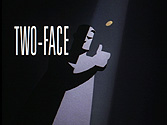|
||
|
| Credits | Cast | |
Story by Alan Burnett (I) Teleplay by Randy Rogel (I) Written by Randy Rogel (II) Directed by Kevin Altieri Music by Shirley Walker Animation by Tokyo Movie Shinsa (I) & Dong Yang (II) |
Kevin Conroy as Bruce Wayne Bob Hastings as Commissioner Gordon Efrem Zimbalist Jr. as Alfred Richard Moll as Harvey Dent/Two Face John Vernon as Rupert Thorne Mari Devon as Summer Gleeson Murphy Cross as Grace |
Micky Dolenz as Min, Max Bob Dooui as Doctor Linda Gary as Dr. Nora Crest Matt Landers as Frankie Diane Michelle as Candace Marc Tubart as Carlow |
|
Straddling the two worlds as he straddles two personalities is Harvey Dent/Two Face. A former D.A. turned master criminal and sporting two half-faces, Two Face is a freak and madman who belongs (and occasionally resides) in Arkham with the other loonies, but who plays on the same turf as Rupert Thorne. This is a brilliant way of reconciling the two story styles. First, his bizarre appearance and tragic history lend extra color and excitement to the hackneyed gangster milieu. Heists and capers are pretty boring fare in a cartoon show; the sight of men in trenchcoats muttering about "shipments" is almost enough to cause the TV to change channels by itself. But the promise of Two Face being behind it all is usually enough to make one pause. He has enough of the black glint of irredeemable malice to make the old moves worthwhile. Second, his moving in a world that looks recognizably like the real world gives his bizarre backstory a certain moral gravity. The Joker, Poison Ivy, Clock King and the rest are creatures of fantasy, but Two Face has a certain hideous plausibility. And his stubborn refusal to retreat from the arena in which he fought and was damaged gives him a kind of integrity. When Jack Napier was similarly damaged he turned into the howling Joker. But Dent will not go gently into that black night; nor will he go raging; he will not go at all. Though he now resides on the other side of the judicial divide, he still operates within the same realm of law and crime. His story is detailed here in an appropriately lurid and melodramatic way. Ironically, the melodrama partially obscures just how bleak and despairing the story is. Ruined and disfigured, both physically and psychologically, Dent sees himself as the helpless victim of thoughtless chance, fated to a new life. This cannot stop him from yearning for Grace, however. And although grace cannot be earned, only bestowed, it must be sought before it can be received. In his one break from that paralyzing slavery he has committed himself to, Harvey reaches for it, and in that one move is betrayed and almost destroyed. The irony almost Satanic. |
|
|
|
Related Episodes |
What Others Are Saying ... |
| Back to Trial |
Forward to Tyger Tyger |


